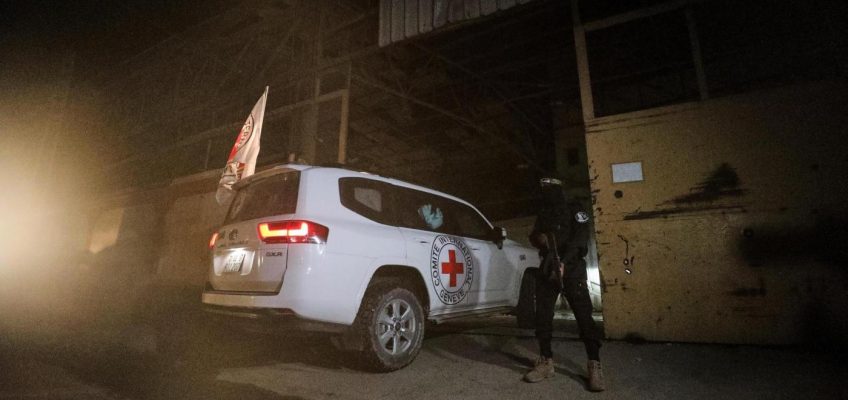By MELANIE LIDMAN and SAMY MAGDY, Associated Press
TEL AVIV, Israel — The Israeli military said Wednesday that one of the bodies handed over by Hamas the previous day as part of the ceasefire deal is not that of a hostage who was held in Gaza, adding to tensions over the fragile truce in the two-year war.
Four bodies were handed over by Hamas on Tuesday to ease pressure on the ceasefire, following an earlier four on Monday — hours after the last 20 living hostages were released. In all, Israel has been awaiting the return of the bodies of 28 deceased hostages.
Israel, which released around 2,000 Palestinian prisoners and detainees on Monday, is also handing over bodies of Palestinians under the deal, a step awaited by many families in Gaza whose relatives went missing during the war.
The military said that after the “examinations at the National Institute of Forensic Medicine, the fourth body handed over to Israel by Hamas does not match any of the hostages.” There was no immediate word on whose body it was.
Israeli Prime Minister Benjamin Netanyahu demanded earlier Wednesday that Hamas fulfill the requirements laid out in the ceasefire deal — introduced by U.S. President Donald Trump — about the return of the hostages’ bodies.
“We will not compromise on this and will not stop our efforts until we return the last deceased hostage, until the last one,” Netanyahu said.
Jewish revelers dance and hold up the Torah as they celebrate the holiday of Simchat Torah next to the plaza known as hostages square, in Tel Aviv, Israel, Tuesday, Oct. 14, 2025. (AP Photo/Francisco Seco)
Returning all living and dead hostages
The U.S.-proposed ceasefire plan had called for all hostages — living and dead — to be handed over by a deadline that expired on Monday. But under the deal, if that didn’t happen, Hamas was to share information about deceased hostages and try to hand over all as soon as possible.
This is not the first time Hamas has returned a wrong body to Israel. Earlier this year during a previous ceasefire, the group said it handed over the bodies of Shiri Bibas and her two sons. Israelis endured another moment of agony when testing showed that one of the bodies returned was identified as a Palestinian woman.
Bibas’ body was returned a day later and positively identified.
Related Articles
Today in History: October 15, Staten Island ferry collision kills 11
What to know about the events leading up to Madagascar’s military coup
Silver hits all-time high as London squeeze sparks market havoc
Snipers on stadium roof but no major incidents as Italy beats Israel in World Cup qualifier
US kills 6 people in strike on boat accused of carrying drugs near Venezuela, Trump says
Hamas and the Red Cross have said that recovering the remains of dead hostages was a challenge because of Gaza’s vast destruction, and Hamas has told mediators of the truce that some are in areas controlled by Israeli troops.
Hazem Kassem, a spokesperson for Hamas, said on the Telegram messaging app on Wednesday that the group was working to return the bodies of the hostages as agreed in the ceasefire deal. He accused Israel of violating the deal with shootings Tuesday in eastern Gaza City and the territory’s southern city of Rafah.
Israel’s defense minister, Israel Katz, said Wednesday the military is operating along the deployment lines laid out in the deal and warned that anyone approaching the deployment line will be targeted — as had happened on Tuesday with several militants.
Two hostages whose bodies were released from Gaza were to be buried on Wednesday. The family invited the public to gather along the road in the afternoon to accompany the body of one hostage from a forensics institute to a cemetery north of Tel Aviv.
Separately, forensic experts in Gaza on Wednesday started identifying 45 bodies of Palestinians that Israel handed over through the Red Cross the previous day without identification. Israel is expected to transfer more bodies, though the total number has not been announced.
It wasn’t immediately clear whether the bodies were those of people who died in Israeli prisons or bodies taken from Gaza by Israeli troops. During the war, the Israeli military has exhumed bodies as part of its search for the remains of hostages.
Desperately needed aid to Gaza
The entrance of humanitarian aid to Gaza was paused for the past two days due to the prisoner and hostage exchange on Monday and a Jewish holiday Tuesday.
The Egyptian Red Crescent said 400 trucks carrying food, fuel, and medical supplies were bound for the Gaza Strip on Wednesday, while Israel and Hamas argue over the slow return of the bodies of deceased hostages.
The Israeli defense body overseeing humanitarian aid in Gaza, COGAT, notified humanitarian organizations on Tuesday that it would allow into Gaza only half of the 600 daily aid trucks called for under the deal.
It was not immediately clear whether it was following through on the threat. COGAT declined to comment on the number of trucks expected to enter Gaza on Wednesday.
On Monday, Israelis celebrated the return of the last 20 living hostages in Gaza and Palestinians rejoiced at Israel’s release of some 2,000 prisoners and detainees as part of the ceasefire’s first phase.
Families of hostages and their supporters have expressed dismay these past days that so few of the dead hostages were being released. Hamas and the Red Cross have said that recovering the remains of dead hostages was a challenge because of Gaza’s vast destruction, and Hamas told mediators of the truce that some are in areas controlled by Israeli troops.
The first four bodies released were all identified as hostages and of the second group of four bodies, three were identified — Uriel Baruch, Tamir Nimrodi and Eitan Levi.
Baruch was kidnapped from the Nova music festival during the Hamas-led terrorist attack on Israel on Oct. 7, 2023, which triggered the war in Gaza.
Nimrodi, who had been serving with the Israeli defense body overseeing humanitarian aid in Gaza, was taken by militants from the Erez border crossing. The Hostages Family Forum, a group representing many of the hostages’ families, says Levi was kidnapped while driving a friend to Kibbutz Be’eri during the Hamas attack.
Magdy reported from Cairo.




